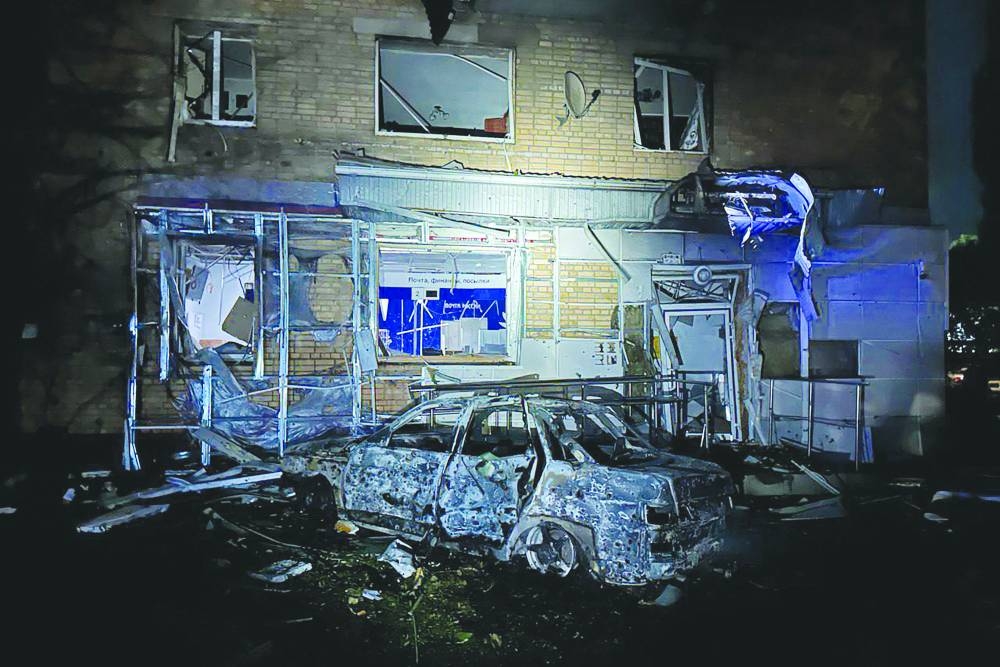Russia yesterday acknowledged Ukrainian forces had pierced deep into the Kursk border region in an offensive that a top official in Ukraine said was aimed to “destabilise” Russia and “stretch” its armed forces.
Kyiv has deployed thousands of troops to the surprise operation, a Ukrainian security official told AFP, seizing the battlefield initiative after months of slow Russian advances across the east.
“We are on the offensive. The aim is to stretch the positions of the enemy, to inflict maximum losses and to destabilise the situation in Russia as they are unable to protect their own border,” the security official said on condition of anonymity.
The shock assault, now in its sixth day, appeared to catch the Kremlin off guard, with Moscow’s army rushing in reserve troops, tanks, aviation, artillery and drones in a bid to quash the incursion.
But its army yesterday appeared to concede that Ukraine had been able to penetrate its territory by up to 30km in places.
In a daily briefing on the situation in the western Kursk region, the defence ministry said it had “foiled attempts” by Ukraine’s forces to “break through deep into Russian territory” using armoured vehicles.
But it said some of those forces were located near the villages of Tolpino and Obshchy Kolodez, which are around 25km and 30km from the Russia-Ukraine border.
The Ukrainian official also said Russia’s claims that Kyiv had deployed 1,000 troops were a serious underestimation.
“It is a lot more... Thousands,” they said.
After days of official silence, President Volodymyr Zelensky acknowledged the offensive for the first time in his nightly address on Saturday, saying that Kyiv was “pushing the war into the aggressor’s territory”.
Russia invaded Ukraine in February 2022 and has waged an unrelenting campaign, occupying swathes of the east and south and subjecting Ukrainian cities to daily missile and drone attacks.
After re-capturing large areas in 2022, Kyiv has largely been on the back foot, increasingly struggling with manpower and arms supplies.
The assault on Russia’s western Kursk region has been the largest and most successful cross-border offensive by Kyiv so far — and the most significant attack by a foreign army on Russian territory since the Second World War.
Russia has used air power, artillery fire and drones in a bid to quash the advance.
It said Saturday that more than 76,000 civilians had been evacuated from border areas, with more leaving yesterday.
Russia’s rail operator has put on emergency trains from Kursk to Moscow, around 450 kilometres away, for those looking to flee.
“It’s scary to have helicopters flying over your head all the time. When it was possible to leave, I left,” said Marina, refusing to give her surname, who had arrived on a train to the Russian capital on Sunday.
An overnight Ukrainian missile strike on a residential building in Kursk city, around 80 kilometres from the fighting wounded 15, Russian officials said.
Across the border in Ukraine’s Sumy region, from where Ukraine launched the incursion, AFP journalists on Sunday saw dozens of armoured vehicles daubed with a white triangle — the insignia apparently being used to identify Ukrainian military hardware being used in the attack.
Ukraine’s Sumy region has also come under retaliatory fire, and authorities there plan to evacuate some 20,000 people from the border zone.
At an evacuation centre in the regional capital of Sumy, retired metal worker Mykola, who had fled his village of Khotyn some 26km from the Russian border, said the offensive had given him a morale boost.
“Let’s let them find out what it’s like. They don’t understand what war is. Let them have a taste of it,” the 70-year-old told AFP, despite being forced to leave his home.
Analysts said Kyiv may have launched the assault in a bid to relieve pressure on its troops in other parts of the sprawling front line. But the Ukrainian official said there had been little effect so far on fighting in the east.
“Their pressure in the east continues, they are not pulling back troops from the area,” he said, adding that “the intensity of Russian attacks has gone down a little bit”. Russia has announced a local state of emergency in the Kursk region, as well as a “counter-terror operation” there and in two other border regions.
The Ukrainian official said he expected Russia would “in the end” manage to stop the incursion and that Ukraine was bracing for retaliation with a large-scale missile attack, including “on decision-making centres” in Ukraine.

A destroyed car next to a damaged residential building following a missile attack in Kursk, Russia. (AFP)
